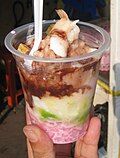Tapai
Tapai (also spelled tapay or tape), is a traditional fermented food found throughout much of East- and Southeast Asia. It is a sweet or sour alcoholic paste and a rich source of vitamin B. The fermentation process involves a variety of yeast and lactic acid bacteria, which contribute to the unique flavor, texture, and aroma of the product.
History[edit]
The origins of tapai are unclear, but it is believed to have been developed independently in various regions of Asia. It is a traditional food in many cultures, and is often associated with festive occasions and rituals.
Production[edit]
The production of tapai involves the fermentation of starch-rich foods such as rice, corn, and root crops. The process begins with the preparation of the raw materials, which are soaked, cooked, and cooled. The cooled material is then inoculated with a starter culture, typically a mixture of yeast and lactic acid bacteria. The inoculated material is packed into containers and allowed to ferment for several days to weeks.
During fermentation, the microorganisms break down the starches into sugars, which are then converted into alcohol and lactic acid. The result is a sweet or sour paste with a distinctive aroma and flavor.
Varieties[edit]
There are many varieties of tapai, each with its own unique characteristics. These include:
- Tapai Pulut: A type of tapai made from glutinous rice. It is popular in Malaysia and Indonesia.
- Tapai Ubi: A variety made from cassava. It is common in the Philippines and Indonesia.
- Tapai Nasi: A variety made from non-glutinous rice. It is popular in Malaysia and Indonesia.
Consumption[edit]
Tapai is typically consumed as a snack or dessert. It can be eaten on its own, or used as an ingredient in other dishes. In some cultures, it is also used as a medicinal food, believed to aid digestion and improve health.
See also[edit]
-
Tapai
-
Tapai
-
Tapai
-
Tapai
-
Tapai
-
Tapai
Ad. Transform your life with W8MD's Budget GLP-1 injections from $75


W8MD offers a medical weight loss program to lose weight in Philadelphia. Our physician-supervised medical weight loss provides:
- Weight loss injections in NYC (generic and brand names):
- Zepbound / Mounjaro, Wegovy / Ozempic, Saxenda
- Most insurances accepted or discounted self-pay rates. We will obtain insurance prior authorizations if needed.
- Generic GLP1 weight loss injections from $75 for the starting dose.
- Also offer prescription weight loss medications including Phentermine, Qsymia, Diethylpropion, Contrave etc.
NYC weight loss doctor appointmentsNYC weight loss doctor appointments
Start your NYC weight loss journey today at our NYC medical weight loss and Philadelphia medical weight loss clinics.
- Call 718-946-5500 to lose weight in NYC or for medical weight loss in Philadelphia 215-676-2334.
- Tags:NYC medical weight loss, Philadelphia lose weight Zepbound NYC, Budget GLP1 weight loss injections, Wegovy Philadelphia, Wegovy NYC, Philadelphia medical weight loss, Brookly weight loss and Wegovy NYC
|
WikiMD's Wellness Encyclopedia |
| Let Food Be Thy Medicine Medicine Thy Food - Hippocrates |
Medical Disclaimer: WikiMD is not a substitute for professional medical advice. The information on WikiMD is provided as an information resource only, may be incorrect, outdated or misleading, and is not to be used or relied on for any diagnostic or treatment purposes. Please consult your health care provider before making any healthcare decisions or for guidance about a specific medical condition. WikiMD expressly disclaims responsibility, and shall have no liability, for any damages, loss, injury, or liability whatsoever suffered as a result of your reliance on the information contained in this site. By visiting this site you agree to the foregoing terms and conditions, which may from time to time be changed or supplemented by WikiMD. If you do not agree to the foregoing terms and conditions, you should not enter or use this site. See full disclaimer.
Credits:Most images are courtesy of Wikimedia commons, and templates, categories Wikipedia, licensed under CC BY SA or similar.
Translate this page: - East Asian
中文,
日本,
한국어,
South Asian
हिन्दी,
தமிழ்,
తెలుగు,
Urdu,
ಕನ್ನಡ,
Southeast Asian
Indonesian,
Vietnamese,
Thai,
မြန်မာဘာသာ,
বাংলা
European
español,
Deutsch,
français,
Greek,
português do Brasil,
polski,
română,
русский,
Nederlands,
norsk,
svenska,
suomi,
Italian
Middle Eastern & African
عربى,
Turkish,
Persian,
Hebrew,
Afrikaans,
isiZulu,
Kiswahili,
Other
Bulgarian,
Hungarian,
Czech,
Swedish,
മലയാളം,
मराठी,
ਪੰਜਾਬੀ,
ગુજરાતી,
Portuguese,
Ukrainian




